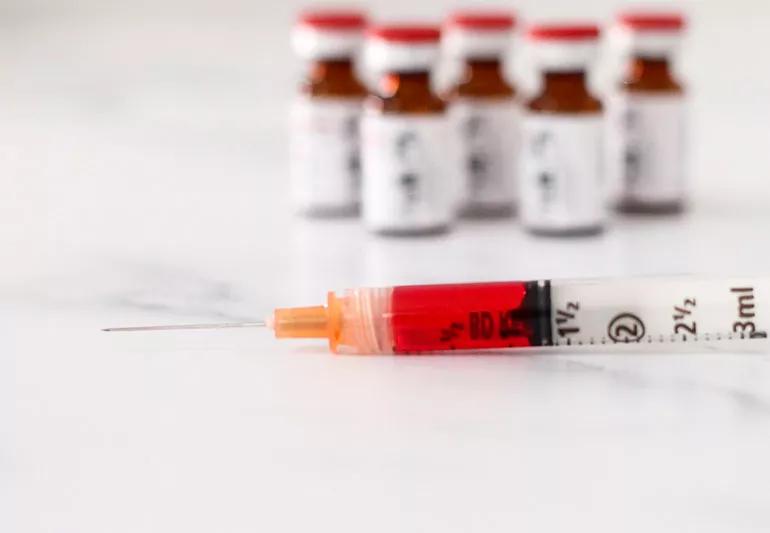If you have low B12 or a true deficiency, these shots can work wonders

Image content: This image is available to view online.
View image online (https://assets.clevelandclinic.org/transform/91f71709-752a-4547-a405-afe28cef85c2/vitaminB12ShotVials-1171408028_770x533_jpg)
vitamin b12 shot in foreground with vials in background
When you think of vitamins, what comes to mind? Maybe you imagine a leafy, veggie-laden salad or some other healthy, nutrient-rich food. Maybe your mind turns to cartoon-shaped chewable tablets or the many selections in the supplement aisle. But what about injections?
Advertisement
Cleveland Clinic is a non-profit academic medical center. Advertising on our site helps support our mission. We do not endorse non-Cleveland Clinic products or services. Policy
If you have a low vitamin B12 level, getting a boost in the form of injections or pills can go a long way toward improving your health and overall well-being.
But if your B12 level is normal? Well, don’t fall for the hype that they’ll magically help you shed pounds or give you Tasmanian Devil-like energy levels.
Let’s dig deeper into what vitamin B12 injections are, whether they work and who should — and shouldn’t — look into them.
Vitamin B12, or cobalamin, is a water-soluble vitamin that helps your body produce red blood cells and DNA. It’s also important for healthy brain function and keeping your energy levels high.
But having a low B12 level or a vitamin B12 deficiency can cause physical, neurological and psychological issues. In this case, your healthcare provider will recommend supplementation to help get your level where it should be.
“If your B12 level is found to be below normal, replacing that vitamin B12 is very important,” explains family physician Kenneth Goodman, MD. “Vitamin B12 shots or B12 pills will be essential for your health.”
Vitamin B shots are injected into your muscle or deeply under your skin, usually in an area like your upper arm or thigh. To start, you may need them every day or every other day. But as your B12 level rises, you’ll be able to get them more infrequently.
Advertisement
“Depending on what’s causing your low B12 level, you may only need vitamin B injections until your level gets back to normal,” Dr. Goodman says, “though some people require them for the long term.” Your healthcare provider will make recommendations based on your B12 level, age, diet and overall health.
Getting vitamin B12 injections to raise your B12 level to where it should be often improves symptoms like:
If left untreated, vitamin B12 deficiency can lead to severe problems, including neurological (nervous system) damage that can’t be reversed.
Vitamin B12 shots can often undo symptoms of a low vitamin B12 level — but the issue is that you might not have any idea that your B12 levels are low to begin with.
“Because B12 levels aren’t checked during routine blood work, a deficiency can go undetected for years,” Dr. Goodman notes. Plus, the symptoms of low B12 can be very subtle, or they may be confused for symptoms of other conditions.
Low vitamin B12 levels are more common among those who:
If you’re experiencing troubling symptoms or believe you’re at high risk for a deficiency, raise these concerns with a healthcare provider, who may decide that you should be tested.
If you have low B12 and are battling fatigue and/or depression, raising your B12 level back to normal can ease these symptoms and help you feel more energetic. This could ultimately lead you to lose some weight. But B12 shots themselves aren’t associated with weight loss.
And if your B12 levels are normal, getting B12 injections isn’t going to do anything. Studies show that high vitamin B12 levels may be associated with a lower risk of having obesity, but, again, that doesn’t mean that getting vitamin B12 shots will help you lose weight.
“If your B12 level is normal, there is little evidence to support that they actually work for these purposes,” Dr. Goodman states.
Some people pursue vitamin B12 shots because they believe that doing so will increase their energy levels. If you have low B12, this is likely true — but if you don’t have low B12, don’t count on it.
“Taking additional B12 hasn’t been found to be of benefit,” Dr. Goodman clarifies.
Vitamin B12 injections are far from the only way to get vitamin B12. In fact, most people are able to get enough vitamin B12 through diet alone. It’s found in lots of common foods, like:
Advertisement
If you’re found to have low B12, your healthcare provider may first try over-the-counter supplementation like a dissolvable B12 capsule or tablet or a B12 nasal spray. But if they don’t get your B12 level where it needs to be, injections may be the next step.
“As people age, they sometimes have trouble absorbing vitamin B12, even when taking pills by mouth,” Dr. Goodman explains. “That’s when we think about vitamin B12 via injection.”
Advertisement

Sign up for our Health Essentials emails for expert guidance on nutrition, fitness, sleep, skin care and more.
Learn more about our editorial process.
Advertisement
The popular skin care ingredient can help smooth, brighten and strengthen your skin
Though it was once used as a cholesterol-lowering medication, niacin is no longer a recommended treatment
Some protein-containing foods are known to be good sources of biotin — but there are also likely other foods that just haven’t been studied yet
This essential nutrient helps convert food into energy, but don’t expect wonders for your nails and hair
This important B vitamin has benefits for your heart, brain and skin
Taking supplements with biotin can cause inaccurate lab test results
Pantothenol is a powerful moisturizer and can help repair damaged skin and hair
Getting enough thiamine in your diet can protect your heart, brain and nervous system
Although it could be used as a moisturizer, this new trend is not recommended
Communicating clear limits helps protect your time, energy and emotional well-being
High cholesterol can be genetic, but testing and treatment can lower your heart disease risk